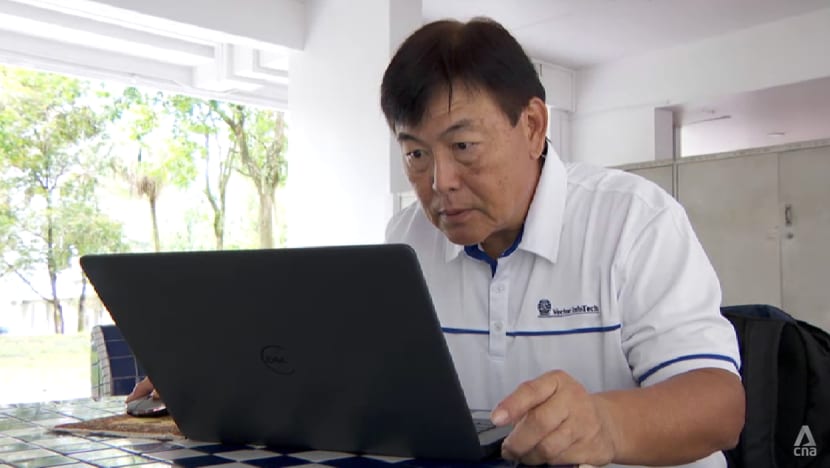Former business manager makes career switch to become solar engineer at 65
Industry watchers said courses that mid-career workers take up must address the gaps and needs of the job market moving forward.

Former business manager Oliver Chen made a career switch to became a solar engineer at the age of 65.

This audio is generated by an AI tool.
SINGAPORE: At 65 years old, most people are looking forward to their retirement.
But former business manager Oliver Chen made a career switch at that age and became a solar engineer instead.
After 18 years of managing businesses in Dubai, he returned to Singapore and joined a solar panel installation company Vector Green. However, the project manager lacked certain skillsets.
BRIDGING THE GAP
"I have four engineers working together with me. They are all (university graduates) and are quite knowledgeable,” said Mr Chen, who took up a specialist diploma in solar engineering to help him bridge the gap.
“So to be on this platform, I needed to enhance my own knowledge. So I have no choice.”
More mid-career workers are taking up diploma programmes to upskill and get a career boost, according to observers.
However, industry watchers said such courses must address the gaps and needs in the job market.
For Mr Chen, now 67, the specialist diploma he enrolled in also prepared him well when it came to maintaining solar panels.
“In a few years’ time, the solar panels will need maintenance,” he said. “So I think I have the knowledge to do all this maintenance, which is a good business too.”
Human resource experts said additional support is expected to push more mid-career workers who are already thinking about upskilling to take the plunge.

HELPING MID-CAREER WORKERS
Singaporeans aged 40 and above will receive an additional S$4,000 (US$2,980) in SkillsFuture credits in May, which will further offset out-of-pocket fees for selected training courses. Younger Singaporeans will receive the same amount when they turn 40.
Educational institutions told CNA that they are seeing more adult learners.
Ngee Ann Polytechnic (NP) said it has seen about 20 per cent more mid-career workers taking on such diploma programmes over the past year.
Among the courses that are in higher demand are smart facilities management, student care and digital content.
“Typically, it will be adult learners who are already dabbling, (or are at an) entry level in those fields. So they want to deepen their knowledge and, of course, to sort of move further in the second career,” said Ms Christy Chung, director of NP’s Continuing Education and Training Academy.
“The motivation to do well and to find a job or related job subsequent to that is very high. So it's about finding willing employers to do the matching. We have learning and career ambassadors in the campus itself to specifically serve this group of adult learners.”
To better align their courses with industry needs, schools are also turning to companies to curate, design and even conduct classes.
Mr Bernard Nee, deputy president for industry and community at the Singapore Institute of Technology (SIT), cited how telecom company Singtel, for instance, was pushing for sustainable data centres and it “wanted a series of programmes to upskill the workforce to support this new initiative”.
SIT worked with the Institute of Technical Education (ITE) and various polytechnics, such as Temasek Polytechnic, Singapore Polytechnic and Nanyang Polytechnic, to offer a series of short courses for this sector, “in different functional roles, as well as to create a extra upgrading pathway for the workforce from ITE Nitec to a diploma and eventually a degree”, he added.

EMPLOYERS NEED TO SEE UPSKILLING AS AN INVESTMENT
Mr Nee said the government has over the last few years “launched a lot of initiatives and made it more accessible for Singaporeans to upskill and upgrade”.
Workers are starting to take up courses to stay competitive and increase their potential incomes, he added.
“Upskilling is very important, especially in today’s day and age. Technology is shifting very fast, industries are being disrupted. The workforce needs to upskill and upgrade.”
Industry watchers encouraged workers to do their own research on market sentiments demand before making a career switch.
“It's very different from upskilling. So understanding the sort of the job description that you are looking to target for yourself, and from there, the right programmes are quite straightforward,” said Ms Richa Doyle, director at recruitment firm Page Personnel Singapore.
“However, I still think that it's important to find ways to leverage on current experiences and strengths to attain more favourable responses and opportunities.”
While workers upgrade themselves, employers are also encouraged to recognise the value of hiring workers who have made the effort to upskill or reskill, and see it as “a business investment”, she added.
“The skills revolution is happening now, whether we like it or not,” said Ms Doyle.
“So the best way forward is really to ensure that you are diving into something which is going to add value to your future career opportunities, and not completely derail from something which has led to a quite decent foundation and career.”


















